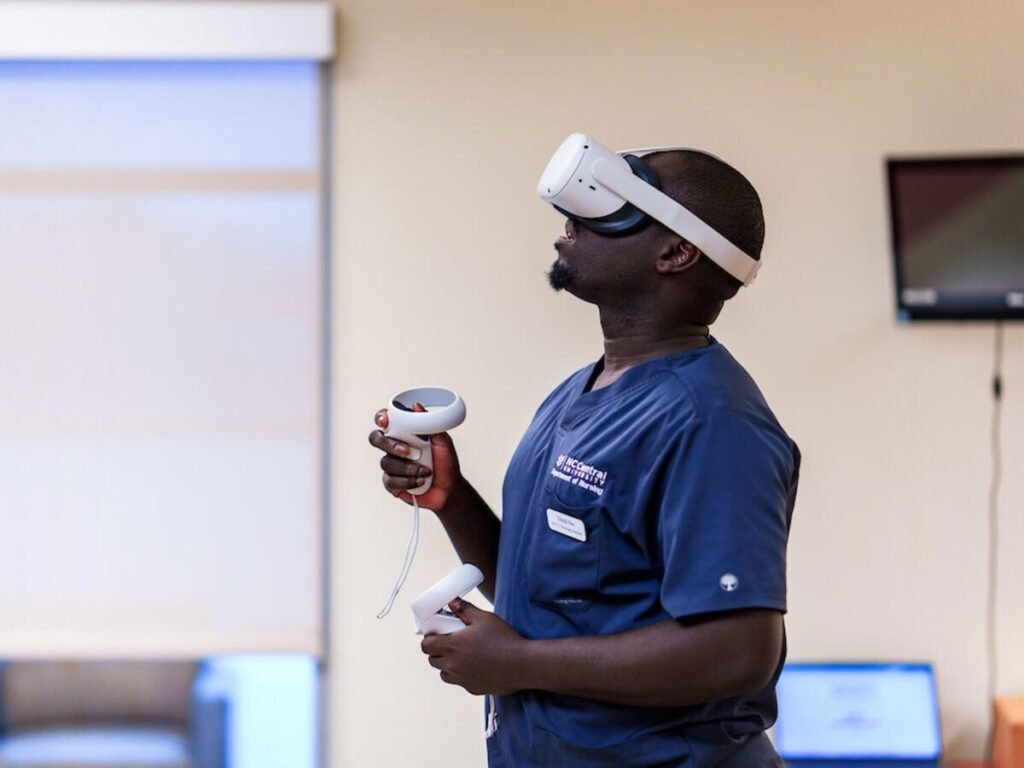North Carolina Central University has introduced a new tool in training tomorrow’s nurses: an Immersive Interactive Room, a state-of-the-art lab that surrounds students with projected sights, sounds, and even smells that mimic real clinical environments. The facility, unveiled last week, makes NCCU the first nursing program in North Carolina to adopt this interactive technology.
Preparing Students Without the Risk
For nursing students, clinical rotations with live patients remain essential but also stressful. “When we’re out shadowing nurses for clinicals, we have strict rules around what we’re allowed to do and not allowed to do,” said Kathryn Chapman, a senior nursing student. “The patient is a real person, so you have that concern of, what if I make a mistake?”
The immersive room provides an alternative: high-stakes practice without the stakes. Inside the lab, three adjoining walls become screens displaying thousands of settings, from emergency rooms to disaster sites. Fans simulate wind; scent generators emit odors ranging from burning rubber to blood. Sounds of beeping monitors or street traffic fill the space, creating a multi-sensory environment where students rehearse decision-making.
“This immersive room represents a leap forward in how we teach, learn, and simulate real-world scenarios,” said Dr. Yolanda Vanriel, chair of the Department of Nursing. “Our students can strengthen critical thinking, cultural humility, and readiness for practice in a diverse healthcare system.”
From Ambulances to the Eiffel Tower
During the ribbon-cutting, attendees toured a wide range of possible scenarios: a ride-along in an ambulance, a visit to the emergency department, people-watching under the Eiffel Tower, and even downtime on a virtual beach. While not all sensory features were enabled, the demonstration underscored the technology’s range.
“The system can pipe in gas, burning rubber, or the smell of blood from a GI bleed,” explained Tina Scott, director of the experiential learning center. “If students are going to encounter it in a hospital, they can first experience it here.”
The room uses 3D-enabled software, surround-sound, haptics, and touchscreen controls. Nursing faculty and NCCU’s IT team, including technician Michael Render, are developing custom programs tailored to the curriculum. The university is also exploring cross-department collaborations—such as with art and media studies—to expand the library of scenarios.
Part of a Larger Push in Experiential Learning
The Immersive Interactive Room builds on NCCU’s earlier partnership with 3B Scientific, which provided responsive mannequins and VR headsets for simulation. Together, mannequins, VR, and immersive projection give students a layered training approach before interacting with live patients.
“It’s not a living, breathing person, so you can practice and learn correct practices and safe habits before you interact with a real person,” Chapman said.
The technology also reduces costs. Instead of constructing multiple specialized simulation rooms, the program can project scenarios onto the lab’s walls at the touch of a screen. “You don’t have to build a whole lot of rooms when you can just build your scenarios,” Scott added.
Enrollment and Competition
NCCU enrolls more than 100 students in nursing programs, including traditional undergraduates, accelerated second-degree students, and online RN-to-BSN candidates. The program was among the first in the UNC System to expand adult learning through Project Kitty Hawk, a statewide initiative for online education.
Enrollment has climbed steadily: online enrollment rose 22 percent since 2024, and pre-nursing ranks among the most popular programs. University leaders point to facilities like the immersive lab as vital recruiting tools.
“It will let students know they’re going to a university that’s not behind the eight ball,” Scott said. “They’re going to graduate already ahead of the game.”
Why It Matters
Nursing programs nationwide face shortages of clinical placements and preceptors. Simulation technology—endorsed by the National Council of State Boards of Nursing as a safe and effective supplement to clinical hours—offers a partial solution. NCCU’s investment also highlights how historically Black colleges and universities (HBCUs) are competing with larger institutions by adopting cutting-edge technologies.
Looking Ahead
NCCU administrators believe the immersive room can benefit more than just nursing. Other health sciences programs and even arts and humanities departments may use the space to stage scenarios, research, or community outreach projects.
For now, the Department of Nursing sees the technology as a cornerstone of its strategy to prepare students for a fast-changing healthcare landscape. “With immersive learning, VR, and mannequin simulations, our students leave with the confidence that comes from practice,” Vanriel said.
At the Bull City Citizen, we spotlight investments like these because they represent more than innovation: they shape Durham’s future workforce, expand opportunity, and strengthen the region’s healthcare system. Our newsroom is committed to following the story as NCCU’s nursing graduates move from simulation to the frontlines of patient care.












